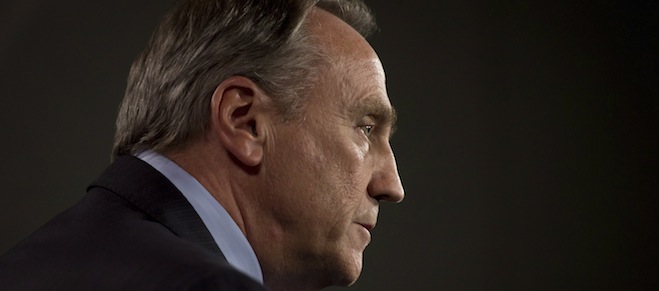Aboriginal Affairs Minister John Duncan’s First Nations connections
‘What keeps me grounded is my First Nations friends,’ says senior cabinet minister
Aboriginal Affairs and Northern Development Minister John Duncan speaks about meetings between the prime minister and aboriginal leaders Friday January 11, 2013 in Ottawa. THE CANADIAN PRESS/Sean Kilpatrick
Share

For a story in this week’s issue of Maclean’s, I interviewed several key figures about the ongoing controversy sparked by the “Idle No More” aboriginal protests, and the bid by the Assembly of First Nations to reassert its leadership through high-level, high-pressure talks with the federal government.
I focus on tensions over the process for settling comprehensive land claims. It’s not that this issue overshadows, say, improving education on reserves or figuring out how to give First Nations a share of resource revenues. But the claims negotiations do seem a clear point of friction, and thus a highly visible test for both the AFN’s leadership and Aboriginal Affairs Minister John Duncan.
Duncan himself is, it seems to me, an inexplicably low-profile figure in all of this. After all, he’s the senior cabinet minister on the most-watched federal policy file of the past couple of months. Yet you don’t see all that much of him. Although he is far from a dynamic politician, Duncan is interesting if only for his unusually close personal links to First Nations.
He doesn’t make much of it, but Duncan’s son and two daughters are status Indians (in the outdated terminology that still legally applies) since their late mother was a member of Vancouver Island’s Ahousaht First Nation. Yes, you’ve heard of Ahousaht: AFN National Chief Shawn Atleo’s home community. Mary Duncan died early last year, having separated from John Duncan a few years before.
I asked Duncan about their children in an interview last week. They are all adults living in B.C., he told me rather guardedly—a carpenter, a mechanic and an aesthetician. Asked if they give him much feedback on policy or politics, he laughed and said they are not all that interested. “They see me now and again on television, and that’s about it,” he said.
But Duncan said he has other close friends from B.C.’s diverse aboriginal communities whose perspectives do figure into his political decision-making. “I’ll put it to you very simply. What keeps me grounded is my First Nations friends, who are constant companions,” Duncan said. “If I am off-side, they would be the first ones to tell me.”
His rapport with the AFN’s leadership, though, is another matter. With Atleo on sick leave, the assembly’s B.C. regional chief, Jody Wilson-Raybould, already important, has taken on an even bigger role. And she happens to come from the We Wai Kai First Nation in Duncan’s own riding of Vancouver Island North. I asked her about that connection. “I know him,” she said. “We have relationships with him in terms of him being our member of Parliament.”
Given that familiarity, I asked, does she feel comfortable working with him on tough issues? She answered: “I think that the way things have gone in terms of our issues, in terms of comprehensive claims policy, I think there’s a reason why we asked for that high-level oversight from the Prime Minister.”
I followed up by asking if she could be more specific in assessing Duncan’s performance in his portfolio. “I don’t want to actually speak about individual people,” Wilson-Raybould said.